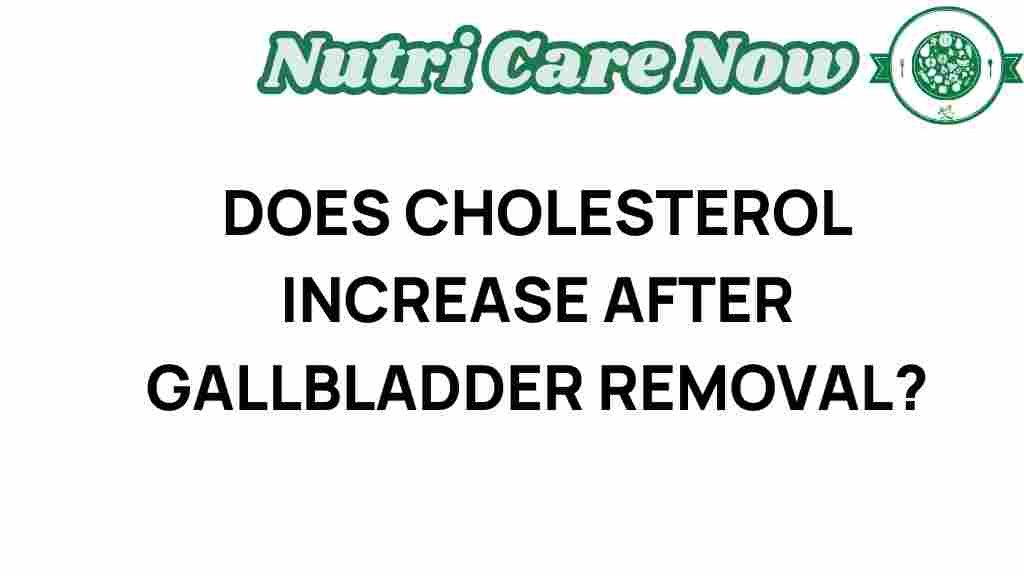Unraveling the Mystery: Does Cholesterol Rise After Gallbladder Removal?
Gallbladder removal, known medically as cholecystectomy, is a common surgical procedure performed to treat various gallbladder-related issues, including gallstones and inflammation. One of the questions frequently asked by patients post-surgery is whether this procedure affects their cholesterol levels. In this article, we will explore the relationship between cholesterol and gallbladder removal, discussing the implications for health, diet, bile salts, liver function, and overall digestive health.
Understanding Cholesterol and Its Role in the Body
Cholesterol is a waxy, fat-like substance that is essential for the body. It plays a crucial role in:
- Building cell membranes
- Producing hormones
- Creating vitamin D
- Facilitating the production of bile salts necessary for digestion
Cholesterol is transported through the bloodstream by lipoproteins, which are classified into two main types:
- Low-Density Lipoprotein (LDL): Often referred to as “bad cholesterol,” high levels of LDL can lead to plaque buildup in arteries.
- High-Density Lipoprotein (HDL): Known as “good cholesterol,” HDL helps remove other forms of cholesterol from the bloodstream.
The Gallbladder’s Function and Its Removal
The gallbladder is a small organ located beneath the liver. Its primary function is to store and concentrate bile, which is produced by the liver. Bile is essential for digesting fats and absorbing fat-soluble vitamins. When you eat, the gallbladder releases bile into the small intestine to aid in digestion.
After gallbladder removal, the body must adapt to a new way of managing bile. The liver continues to produce bile, but instead of being stored, it drips continuously into the intestine. This change can impact how the body processes fats and may influence cholesterol levels.
Does Cholesterol Rise After Gallbladder Removal?
Research shows that cholesterol levels can be affected after gallbladder removal. Here are some key points regarding post-surgery cholesterol:
- Bile Salt Changes: After surgery, the body may produce fewer bile salts, which can lead to changes in fat digestion. This can affect cholesterol metabolism.
- Liver Function: The liver plays a crucial role in managing cholesterol levels. With changes in bile flow, liver function may be impacted, potentially leading to increased cholesterol levels.
- Dietary Changes: Patients often make dietary changes post-surgery, which can also affect cholesterol levels. A diet high in healthy fats may help maintain balanced cholesterol levels.
Post-Surgery Effects on Cholesterol Levels
While some individuals may experience an increase in cholesterol levels after gallbladder removal, others may not notice any significant changes. Several factors can influence this outcome:
- Individual Variation: Each person’s body reacts differently to surgery. Genetics, pre-existing health conditions, and overall lifestyle play a role in cholesterol levels.
- Diet: A diet rich in fiber, healthy fats, and low in saturated fats can help manage cholesterol levels. Post-surgery diets often encourage a focus on whole foods.
- Physical Activity: Regular exercise can help improve cholesterol levels and overall health. Engaging in physical activity is essential for maintaining a healthy weight and supporting heart health.
Managing Cholesterol After Gallbladder Removal
To effectively manage cholesterol levels after gallbladder removal, consider the following tips:
- Adopt a Heart-Healthy Diet: Focus on a diet that includes:
- Fruits and vegetables
- Whole grains
- Lean proteins such as fish and poultry
- Healthy fats like avocados, nuts, and olive oil
- Limit Saturated and Trans Fats: Reduce intake of red meat, full-fat dairy products, and processed foods.
- Stay Hydrated: Drink plenty of water to help maintain digestive health and support liver function.
- Monitor Cholesterol Levels: Regular check-ups with your healthcare provider can help track your cholesterol levels and overall health.
Potential Challenges and Troubleshooting
After gallbladder removal, some individuals may face challenges related to digestion and cholesterol management. Here are some common issues and tips for troubleshooting:
- Digestive Issues: Some patients experience diarrhea or bloating post-surgery. To alleviate these symptoms:
- Gradually reintroduce foods into your diet.
- Consider smaller, more frequent meals.
- Increase fiber intake to help regulate digestion.
- High Cholesterol Levels: If cholesterol levels rise after surgery:
- Consult your healthcare provider for personalized dietary recommendations.
- Consider incorporating cholesterol-lowering foods, such as oats, beans, and fatty fish.
Conclusion
In conclusion, the relationship between cholesterol and gallbladder removal is complex and varies from person to person. While some individuals may experience an increase in cholesterol levels after surgery, others may not see significant changes. Factors such as diet, liver function, and individual health play critical roles in this process.
To effectively manage cholesterol post-gallbladder removal, adopting a heart-healthy diet, staying physically active, and maintaining regular check-ups with your healthcare provider are essential strategies. If you experience any digestive issues or significant changes in your cholesterol levels, don’t hesitate to reach out to your doctor for guidance.
For more information on managing health after gallbladder surgery, check out this comprehensive guide. If you’re interested in further reading about cholesterol management, visit this resource.
This article is in the category Health and created by NutriCareNow Team
